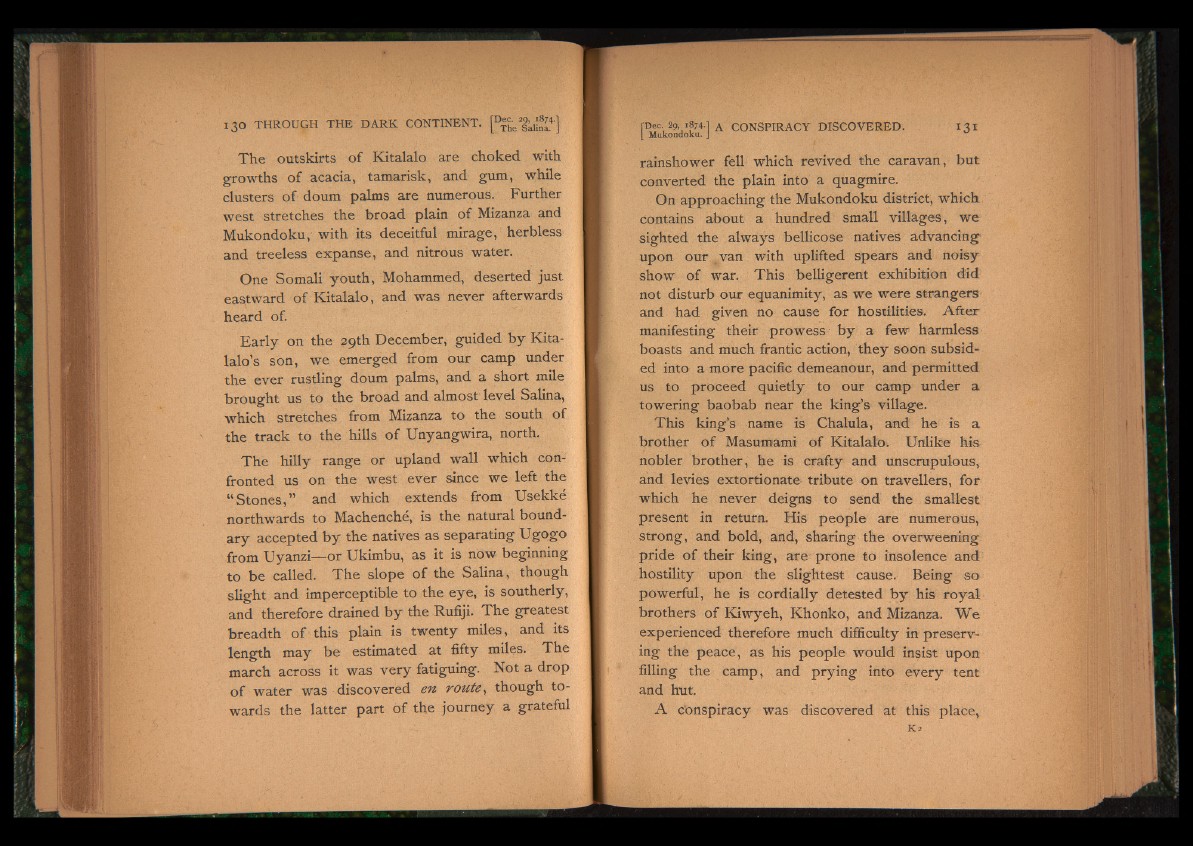
T h e outskirts o f Kitalalo are choked with
growths o f acacia, tamarisk, and gum, while
clusters o f doum palms are numerous. Further
west stretches the broad plain o f Mizanza and
Mukondoku, with its deceitful mirage,’ her bless
and treeless expanse, and nitrous water.
One Somali youth, Mohammed, deserted just
eastward o f Kitalalo, and was never afterwards
heard of.
E a r ly on the 29th December, guided b y Kita-
lalo’s son, we emerged from our camp under
the ever rustling doum palms, and a short mile
brought us to the broad and almost level Salina,
which stretches from Mizanza to the south of
the track to the hills o f Unyangwira, north.
T he hilly range or upland wall which confronted
us on the west ever since we left the
“ S ton e s ,” and which extends from Usekké
northwards to Machenché, is the natural bounda
ry accepted b y the natives as separating U go go
from Uyanzi— or Ukimbu, as it is now beginning
to be called. T h e slope o f the Salina, though
slight and imperceptible to the eye, is southerly,
and therefore drained b y the Rufiji. T h e greatest
breadth o f this plain is twenty miles,, and its
length may b e estimated at fifty miles. The
march across it was v e ry fatiguing. Not a drop
o f water was discovered en ro u te, though towards
the latter part o f the journey a grateful
pec. 2a 1874.1 A CONSPIRACY DISCOVERED.
I Mukondoku. J
rainshower fell which revived the caravan, but
converted the plain into a quagmire.
On approaching the Mukondoku district, which
contains about a hundred small villages, w e
sighted the always bellicose natives advancing
upon our wan with uplifted spears and noisy
show o f war. This belligerent exhibition did
not disturb our equanimity, as we were strangers
and had given no cause for hostilities. A fte r
manifesting their prowess b y a few harmless
boasts and much frantic action, th ey soon subsided
into a more pacific demeanour, and permitted
us to proceed quietly to our camp under a
towering baobab near the king’s village.
This king’s name is Chalula, and he is a
brother o f Masumami o f Kitalalo. Unlike his
nobler brother, he is crafty and unscrupulous,
and levies extortionate tribute on travellers, for
which he never deigns to send the smallest
present in return. His people are numerous,
strong, and bold, and, sharing the overweening
pride o f their king, are prone to insolence and
hostility upon the slightest cause. Being so
powerful, he is cordially detested b y his ro y a l
brothers o f Kiwyeh, Khonko, and Mizanza. W e
experienced therefore much difficulty in preserving
the peace, as his people would insist upon
filling the camp, and prying into every tent
and hut.
A conspiracy was discovered at this place,
it 2